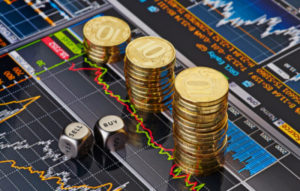
Market making is the quoting of both a buy- and a sell-price in a financial instrument held in inventory, in the hope of making a profit on the bid-ask spread.
In Market making, transactions are events, positions in space and time. Every trade requires a buyer and a seller, ergo a buyer and seller of the same instrument occupying the same position in space and time.
Many instruments exist and there are lots of spaces and times. The chances of somebody willing to buy a sheep and somebody else selling it on Regent Street at midday (prime sheeping time) are low. Markets (economics) try to solve this problem by providing a place, sometimes physical though more often abstract, where parties can transact. Thus, markets put parties interested in exchanging similar things in similar places to increase the probability of a transaction.
This still leaves the problem of time – the buyer wants to buy that sheep at midday but the seller can’t get into Regent Street until 2 Ppm. An enlightened individual seeing that buyer sheepless every morning and noticing the abundance of sheep in the afternoon would note that he might be able to sell the buyer a sheep for a bit more than the gentleman later in the day would charge him.
Of course, this would call for carrying an inventory of sheep. But supposing there are enough buyers and sellers and the prices of sheep aren’t changing too much it is reasonable to assume the risk of the inventory dying in exchange for the spread.
Market making is the process by which broker-dealers offer liquidity in a particular market. Broker dealers take the risk and pledge to hold a particular number of shares in a security. The market makers show their quotes and compete among themselves for the customers’ orders.
Market makers are required to “make a market” which means buy and sell the particular security in which they are market makers. However, they are not required to buy and sell at particular prices.
In order to be able to perform their duties, market makers need to hold inventory of the particular security.
Market Making and Flow Trading requires competition for the flow of orders from their clients by displaying buy and sell quotations for a guaranteed number of shares.
The difference between the price at which a market maker is willing to buy, and the price at which the firm is willing to sell it is called the Spread. This spread represents the potential profit a Market Maker can receive on each trade (both the buy and sell side added together).
Once an order is received, the market maker immediately sells from their own inventory or offsets the order with another firm. Market Makers play an important role in the financial markets, acting as catalysts for daily trading and enhancing the liquidity of equities across the market. However, making money from the differences in bid and ask prices is not the only function of market makers. Within their firm, the main priority is to provide liquidity to the firms’ clients, receiving a commission for each trade.
Check all Junior Broker roles >
